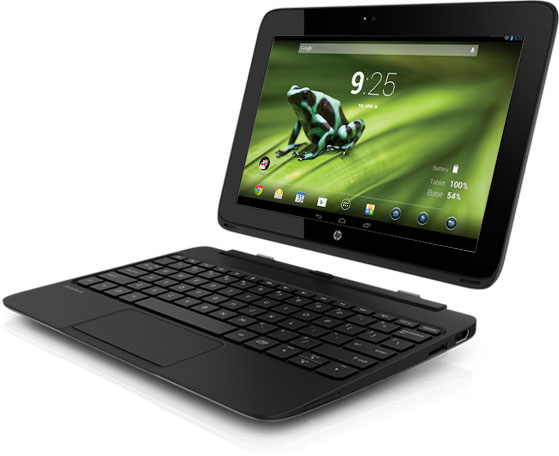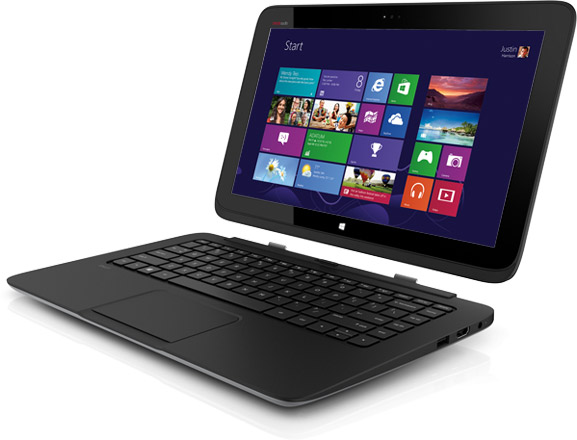HP Introduces New x2 Detachable PC Powered by Tegra 4
HP has expanded its x2 detachable PC line with new Android and Windows 8 models.
HP said on Wednesday that it's expanding its x2 detachable PC portfolio with two new models: the Android-powered HP SlateBook x2 packed with a Tegra 4 SoC, and the Windows 8-powered HP Split x2. Both are slated to launch in the States this August with starting prices of $479.99 and $799.99, respectively.
The new SlateBook x2 joins the HP Slate7 as part of HP’s push to offer access to the full Google experience. It sports Android 4.2.2 "Jelly Bean" and services like Google Now, Google Maps and more. As always, HP is a little cryptic in the actual hardware details, but the device will sport a 10.1-inch HD touchscreen, 64 GB of internal storage, and a DTS Sound+ solution.
"The HP SlateBook x2 enables users to shift effortlessly from entertainment to work by combining tablet portability with notebook productivity in a sleek, lightweight device that uses the popular Android operating system," the company said. "With an advanced magnetic hinge design and dual battery system—one battery in the base and one in the tablet—users can easily switch from notebook to tablet and back, even while on the go."
As for the HP Split x2, it will be based on Intel's third-generation Core processors and Windows 8 Pro. The list of features include a 13.3-inch HD touchscreen, HP Connected Music, Beats Audio, a 2MP HP TrueVision Full HD webcam, and the HP ClickPad for precise multifinger and gesture navigation. It will also sport an "eye-catching design" with a soft-touch coating that provides a comfortable hold and shows fewer fingerprints.
"HP’s unmatched portfolio of next-generation PCs is designed to enable users to connect with their information on devices that easily adapt to their needs," the company said. "By releasing the magnetic hinge, users can move elegantly between the two form factors—tablet and notebook PC—all in one device."
Get Tom's Hardware's best news and in-depth reviews, straight to your inbox.

Kevin Parrish has over a decade of experience as a writer, editor, and product tester. His work focused on computer hardware, networking equipment, smartphones, tablets, gaming consoles, and other internet-connected devices. His work has appeared in Tom's Hardware, Tom's Guide, Maximum PC, Digital Trends, Android Authority, How-To Geek, Lifewire, and others.
-
cknobman Sooooooo do these things come with the base?Reply
If not $479 for an Android slate can kiss my nuts cause that is way too high. -
BringMeAnother Are they planning a refresh for when Haswell comes out? It's hard to get excited for an Ivy Bridge tablet when the new generation is coming out.Reply -
damianrobertjones "HP Introduces New x2 Detachable PC Powered by Tegra 4"Reply
Why isn't the Windows 8 version mentioned in the title? -
mstavrev I wonder, why non of the major computer makers hasn't yet come up with a combined Windows/Android device. The idea I have is an ultrabook chassis build on Intel ivy bridge or haswell and a detachable display that is actually a fully functional Android tablet on its own. When the tablet is attached at the device you may have the option to use it as a display for the x86 machine build into the base, or use the keyboard and other I/O for the Android tablet.Reply
The devices can share the combined battery power when attached to each other. -
WithoutWeakness It looks like they come with the keyboards in the box according to HP's page. The Android version has a 1080p IPS screen. Tegra 4 should bring some solid graphics improvements over Tegra 3.Reply -
burkhartmj Reply10816357 said:I wonder, why non of the major computer makers hasn't yet come up with a combined Windows/Android device. The idea I have is an ultrabook chassis build on Intel ivy bridge or haswell and a detachable display that is actually a fully functional Android tablet on its own. When the tablet is attached at the device you may have the option to use it as a display for the x86 machine build into the base, or use the keyboard and other I/O for the Android tablet.
The devices can share the combined battery power when attached to each other.
I guess if you're using Win7 this would make sense, but Win8 is perfectly at home in either form factor so Android would be kind of redundant and limited in its function compared to a full Win8 intel machine. I have the HP Envy x2 that these will be accompanying in the x2 line, and even on an Atom Z2760 it is a pretty snappy device since Win8 runs so light.
Can't speak for everyone, but for me Android feels odd on a large tablet. It's my OS of choice for phone and it works great on smaller tablets, but Win8 is much better in my experience for larger tablets . -
vmem hmm, tegra 4, I want to see battery life tests on this thing... especially compared to haswell products coming soonReply -
goodguy713 Reply10816357 said:I wonder, why non of the major computer makers hasn't yet come up with a combined Windows/Android device. The idea I have is an ultrabook chassis build on Intel ivy bridge or haswell and a detachable display that is actually a fully functional Android tablet on its own. When the tablet is attached at the device you may have the option to use it as a display for the x86 machine build into the base, or use the keyboard and other I/O for the Android tablet.
The devices can share the combined battery power when attached to each other.
That's because android is not ported to intel processors there might be an emulator but its mostly modified and designed to be used on ARM processors like the ones samsong and qualcom make. -
epobirs Actually, Android is available on x86. Intel has invested a fair bit in getting people to make use of it, especially in phones and low-end tablets. See http://software.intel.com/en-us/android for more info. When Intel talks about $200 notebooks, they mean running Android.Reply
Since most Android coding isn't done in a processor specific way, porting apps can be a pretty straightforward task. Stuff like Blue Stacks already does pretty well at running existing Android apps on higher powered x86 systems. But as for doing a system that runs both Android and Windows, well, they already exist. Sort of. Those machines with an instant-on mode for letting you check messages and other basic tasks in a minimal way usually use something based on a minimized Linux kernel to do the job.
Providing a full on Android system, though, is increasingly pointless. Intel and Microsoft are moving to give portables that same capability with Windows alone. Throw in the previously mentioned Blue Stacks for accessing the Android library and becomes increasingly hard to make a case for a full on Android/Windows box. Far too many consumers would just say 'Why?' instead of 'I want!'

